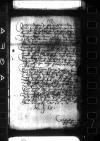List #4681
Mathias PLATEN do Ioannes DANTISCUSGdańsk (Danzig), 1547-08-06
| odebrano Heilsberg (Lidzbark Warmiński), 1547-08-09 Rękopiśmienne podstawy źródłowe:
Pomocnicze podstawy źródłowe:
| ||||||
Tekst + aparat krytyczny + komentarzZwykły tekstTekst + komentarzTekst + aparat krytyczny
Dem hochwirdigsten in Gott furstenn unde herren, hern
Hochwirdigster in Gott Furste, Genediger Herre,
Ewer Furstlichen Genaden szeynth meyne demuttige, gancz borethwyllige, unvordrosszene dynste zcuvorann / unde in allem dynstlich bepfholennn.
Allergenedygster Herre. /
Ich byn danckbaer kegen Ewer Furstlichen Genaden vor alle ere, / fruntschafft / unde begabungen, / dy Ewer Furstlichen Genaden
Genediger Herre, zceythunge ist hy mangerley von
Genediger Herre, Gotth habe lopp, / saltcz ist dysz joer szo vyll gekomen, das unszer bo... nicht vyll mher rahum habennn / unde teglich mhe kumth.
Genediger Herre, nowge zceythunge komt ..., das dy
Domytthe ich Ewer Furstlichen Genaden dem almechtigen Gotte thu bepfholen, der friste unde erhalte Ewer Furstlichen Genaden zcu langen tagen im gl[uck]szeligen geszunden regimente.
Datum
Ewer Furstlichen Genaden guthwylliger u[nde] gehorszamer dy[ner]

